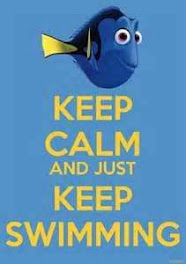Just Keep Swimming
Long, long ago, I graduated with an MFA from Vermont College of Fine Arts Writing for Children and Young Adults (VCFA) and a four-book contract.
We’ve all heard those success stories of debut authors. (I hesitate to use the qualifier “overnight’, as it tends to negate the work that went into the writing.) J.K. Rowling. Veronica Roth. S.E. Hinton. Christopher Paolini self-published his first book, Eragon. He sold thousands of copies, when Random House took notice and bought the rights, and the rest is dragon history. Emma Cline, who wrote The Girls, was offered a three-book contract with a reported $2 million deal.
I was so on my way now!
I signed on with the first agent who would help me with the
multi-contracts. This connection wasn't a hard find. I already had a publisher.
But like any relationship, you want to get to know each other, ask questions, and
make sure it's a good fit. I was too enamored with the idea of it all to ask
questions. This first agent signed the boiler plate contract. This means
that the contracts included a few very strict clauses: the option clause, which
gives the publisher the privilege of publishing your next book (the right of
first refusal), and the non-compete clause, which restricts the author from
publishing another book that competes with the work in question.
"Competes" is a vague description. On the surface, it sounds good.
But the devil is in the details.
It turned out, I could not submit any new work to anyone
else until this publisher first refused – rejected -- that work. And they
weren’t looking at new work until these four contracts were fulfilled. Unable
to move forward, this first agent and I parted ways. I quickly found a second agent,
but she couldn’t renegotiate the clauses because she wasn't the agent on
record. Because she couldn’t sell any new work, we also had to part ways.
My first book came out in 2009, eight years after
signing the contract. My second book was published a year later. My third book
came out in 2012, eleven years after signing the contract. The
fourth contract was cancelled. I went to Author’s Guild, learned what I had to do
to understand these clauses, and renegotiated the particular clauses
myself.
Free at last! Except, you remember, change happens. The folklore
picture book market was bottoming out. The very genre that I had studied,
loved, and sought as my career was no longer an option. So I adapted and moved to middle grade fiction.
I found my new passion.
I also found my third agent. She sold my first two novels within
a year. But again, yes, change happens. Historical fiction was becoming a hard sell.
This third agent decided to focus on younger
(PBs) readers, and we parted ways. Ultimately
I sold my seventh book, a graphic novel, on my own.
Despite having seven books, a few award-winners and
several short stories published in major venues, it was challenging to find an
agent. I had a lot of nibbles: one agent worked with me for a year, undergoing
three revisions. Ultimately, she rejected the manuscript. She loved the
manuscript but explained that it would be a hard sell. Another agent kept
scheduling for The Call, wanting to discuss representation and goals. Three
times she cancelled, and then she ghosted.
The moral of this tale: keep moving forward. It’s about the process. Or, as Dora always sang, Just Keep Swimming.
I stopped submitting to focus more on the story engineering
process, taking classes from some of the best people in the business. (I highly
recommend classes from the indomitable Emma D. Dryden, from the master editors of Eileen
Robinson and Harold Underdown at Kid's Book Revisions, from Lorin Oberweger's FreeExpressions.) And I kept writing. I kept
swimming.
In 2023, one editor finally made an offer (shhhh, it’s not official yet.
But watch this space! Unless, of course, change happens.). Another editor invited me to create
a proposal for a multi-book project. Who-op! The proposal was accepted
and made its way up the chain. With these several manuscripts in hand, I was
able to connect with my current agent. And this time, I knew all the questions that
needed to be asked!
Still, we remember that things can change on a dime. That’s
what it means to have a career in writing: the business of publishing is always
in a state of flux. And so it happened again, the proposed series was rejected.
Except this time, I remembered another important lesson. All things happen for a reason at the time they are supposed to happen. This theme tends to manifest in most of my writings: if one perseveres, life can be full of possible imaginations.
My agent and I agreed. We just needed a new plan. So I went back to work.
And that’s the point of this long-winded travel through time and space. The real success stories – and the real champions -- are not the lucky debuts but we the sloggers, the majority of us who get up every morning and do what we do. We don’t define ourselves by rejections, nor by successes. We write. And if we’re lucky, we have a friend or two who send reminders, wrapped in chocolate, with a note: Yes, rejection sucks. Eat chocolate. Now get back to work.
Go on now. Get back in the water. Keep swimming. And remember….


This. Is. So. True. Just keep swimmin'.
ReplyDeleteChocolate is an essential poolside treat for storytellers. Naps, too, because it’s best not to swim on a full stomach. But you already know these things, champion swimmer that you are! 🥇🏊♀️
ReplyDelete